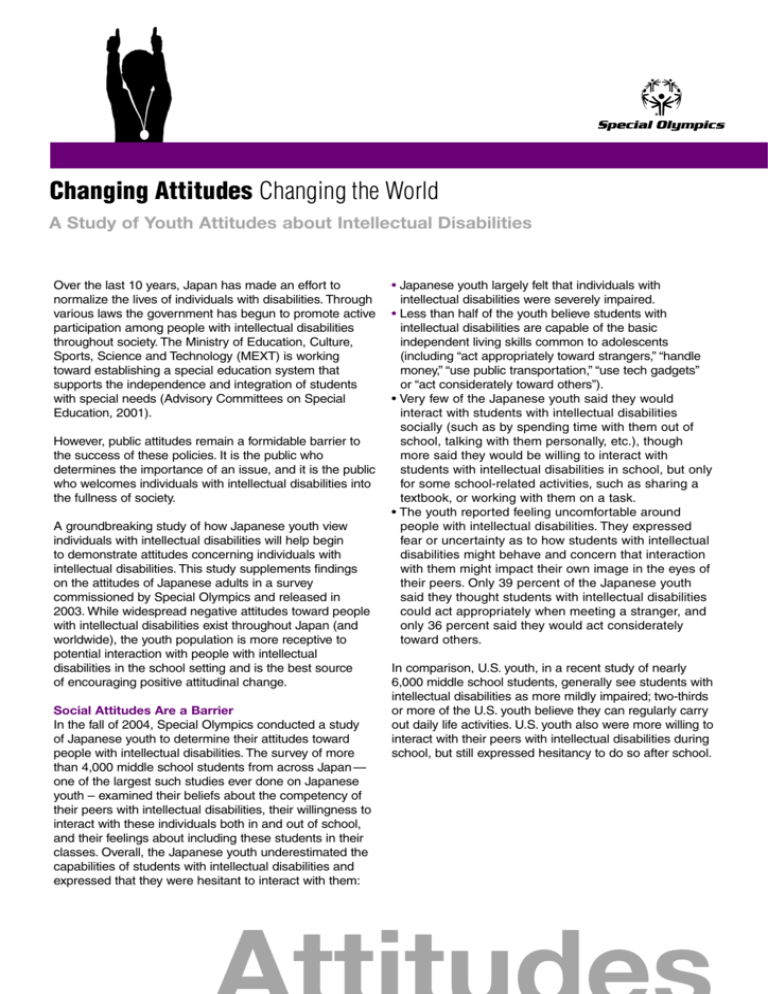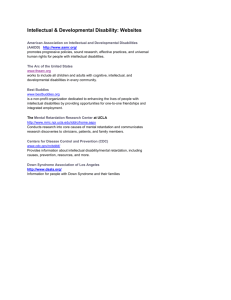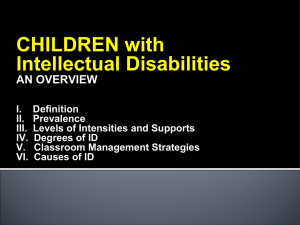Changing Attitudes Changing the World
advertisement

Changing Attitudes Changing the World A Study of Youth Attitudes about Intellectual Disabilities Over the last 10 years, Japan has made an effort to normalize the lives of individuals with disabilities. Through various laws the government has begun to promote active participation among people with intellectual disabilities throughout society. The Ministry of Education, Culture, Sports, Science and Technology (MEXT) is working toward establishing a special education system that supports the independence and integration of students with special needs (Advisory Committees on Special Education, 2001). However, public attitudes remain a formidable barrier to the success of these policies. It is the public who determines the importance of an issue, and it is the public who welcomes individuals with intellectual disabilities into the fullness of society. A groundbreaking study of how Japanese youth view individuals with intellectual disabilities will help begin to demonstrate attitudes concerning individuals with intellectual disabilities. This study supplements findings on the attitudes of Japanese adults in a survey commissioned by Special Olympics and released in 2003. While widespread negative attitudes toward people with intellectual disabilities exist throughout Japan (and worldwide), the youth population is more receptive to potential interaction with people with intellectual disabilities in the school setting and is the best source of encouraging positive attitudinal change. Social Attitudes Are a Barrier In the fall of 2004, Special Olympics conducted a study of Japanese youth to determine their attitudes toward people with intellectual disabilities. The survey of more than 4,000 middle school students from across Japan — one of the largest such studies ever done on Japanese youth – examined their beliefs about the competency of their peers with intellectual disabilities, their willingness to interact with these individuals both in and out of school, and their feelings about including these students in their classes. Overall, the Japanese youth underestimated the capabilities of students with intellectual disabilities and expressed that they were hesitant to interact with them: • Japanese youth largely felt that individuals with intellectual disabilities were severely impaired. • Less than half of the youth believe students with intellectual disabilities are capable of the basic independent living skills common to adolescents (including “act appropriately toward strangers,” “handle money,” “use public transportation,” “use tech gadgets” or “act considerately toward others”). • Very few of the Japanese youth said they would interact with students with intellectual disabilities socially (such as by spending time with them out of school, talking with them personally, etc.), though more said they would be willing to interact with students with intellectual disabilities in school, but only for some school-related activities, such as sharing a textbook, or working with them on a task. • The youth reported feeling uncomfortable around people with intellectual disabilities. They expressed fear or uncertainty as to how students with intellectual disabilities might behave and concern that interaction with them might impact their own image in the eyes of their peers. Only 39 percent of the Japanese youth said they thought students with intellectual disabilities could act appropriately when meeting a stranger, and only 36 percent said they would act considerately toward others. In comparison, U.S. youth, in a recent study of nearly 6,000 middle school students, generally see students with intellectual disabilities as more mildly impaired; two-thirds or more of the U.S. youth believe they can regularly carry out daily life activities. U.S. youth also were more willing to interact with their peers with intellectual disabilities during school, but still expressed hesitancy to do so after school. Japanese and U.S. youth willingness to interact with students with intellectual disabilities What I would do in school Japan Youth U.S. Youth Greet the student 69% 81% Share a textbook with the student 56% 91% Talk with the student at lunch 40% 61% Choose a student with intellectual disabilities 36% 55% Spend time with the student out of school 17% 43% Talk about personal things with the student 20% 29% Invite the student out with friends 22% 38% What I would do out of school “I am opposed to the perspective which considers people with intellectual disabilities as completely different from us. So I think it is good that people with and without intellectual disabilities study and play sports together.” —Japanese Middle School Student Overcoming Misperceptions & Encouraging Change On a promising note, despite the widespread misperceptions, the survey also found that Japanese youth were willing to include students with intellectual disabilities in their schools and classrooms. Japanese youth beliefs about where students with intellectual disabilities can learn are even more positive than those of U.S. youth, who believe students with intellectual disabilities should learn in special classes. The continuing hesitation to include students with intellectual disabilities in classrooms can largely be attributed to more than 75 percent of the youth respondents in both Japan and the United States voicing concern that it could impair their own learning experiences by making lessons too easy or making it harder to concentrate. Though youth in both Japan and the United States thought that these consequences were important, almost all the youth in both countries also recognize the positive impact inclusion can have on them, by making them more caring and understanding of people’s differences. In fact, almost all Japanese youth believe that students with intellectual disabilities can participate in non-academic classes such as art (84 percent) and gym (73 percent). Many fewer youth believe students with intellectual disabilities can participate in the harder academic classes, such as language (40 percent) and math (20 percent). 2 The youth in both Japan and the United States also feel that people with intellectual disabilities could engage in physical activity or play on a sports team. More than 75 percent felt that individuals with intellectual disabilities were able to participate in sports. More than 70 percent of Japanese youth and nearly 90 percent of U.S. youth felt people with intellectual disabilities were capable of playing on sports teams with other individuals with intellectual disabilities, but only 60 percent of Japanese youth and 58 percent of U.S. youth believe that people with intellectual disabilities were capable of playing sports with players without intellectual disabilities. Overall, the fact that youth are open to greater inclusion of students with intellectual disabilities represents a major foothold for changing attitudes, as it means that the youth recognize the importance and value of students with intellectual disabilities in their world. Adult Attitudes In contrast to the youth’s openness to greater social and educational inclusion of individuals with intellectual disabilities, a June 2003 Special Olympics-commissioned survey that spanned 10 countries, including Japan, found that adults held pervasive misunderstandings and misbeliefs about individuals with intellectual disabilities. Most strikingly, more than 60 percent of the respondents believed students with intellectual disabilities should be educated in special schools, apart from other children. In Japan, this reflects the long-standing practice of segregating children with intellectual disabilities and an overall cultural hesitancy about disabilities. • Additionally, more than half of Japanese adults surveyed believed that including children with intellectual disabilities in regular classrooms would be detrimental to the learning process for all the children. • Moreover, almost all the Japanese public believes that teachers are not properly trained and schools lack resources to meet the needs of children and youth with intellectual disabilities. • Surprisingly, many Japanese adults also expressed a belief that youth have negative attitudes which could act as an obstacle to including students with intellectual disabilities in regular classes. “It is no problem that a student with intellectual disabilities studies with regular students. I’m aware that he/she needs special assistance, but I don’t think it will lead to disturbance of the whole class. Rather, boys in my class are much noisier and are causing much more disturbance.” —Japanese Middle School Student 3 Opportunities to Interact Lead to More Positive Attitudes It is evident that both Japanese youth and adults do have negative attitudes toward people with intellectual disabilities. However, the youth are largely reflecting what is around them — the limited visibility of people with disabilities, cultural stigma and expectations assigned to people with disabilities. Despite their misperceptions and hesitancies, Japanese youth are still accepting of including people with intellectual disabilities in mainstream society and schools. This suggests that as inclusion of people with intellectual disabilities into general society increasingly occurs throughout Japan, youth will become more and more accepting of these students. Through its research and its 37-year history, Special Olympics has found that the more opportunities people have to interact with individuals with intellectual disabilities, the greater their perception of those individuals’ competence. This improved perception of competence leads to more positive attitudes toward individuals with intellectual disabilities. The beneficial cycle needs to be encouraged by improving the quality and quantity of interactions between people with and without intellectual disabilities. In Japan, schools are the best venue to encourage this increased interaction and to foster an open dialogue about roles and attitudes throughout society. As one Japanese student expressed, “[This experience has made me realize] that I had somehow discriminated against people with intellectual disabilities. We do wrong things, knowing they are wrong. If we can change this attitude, Japan will be a better society for people with intellectual disabilities.” “I know a theatrical company whose members all have disabilities of some sort. And some of them have intellectual disabilities. But when they are acting, they look so alive and I thought, ‘Hey, people can do anything they want!’ I actually went to help them yesterday. They are kind and funny. I like them a lot.” —Japanese Middle School Student 4 “There is nobody who has an intellectual disability around me, so I don’t know how they actually behave. In my mind they are different from me. I draw a clear line between ‘them’ and ‘us.’ I know this is wrong, but I can’t help it. I guess people who actually know about intellectual disability will call this misunderstanding. But as I said, I don’t have anyone with intellectual disability around me and there is no way I can know about it. Misunderstanding is to some extent inevitable. Still I hope Special Olympics will help us get rid of misunderstanding.” —Japanese Middle School Student Purpose and Methodology: The Japan Youth Attitude Study was conducted to ascertain knowledge of, and attitudes toward, individuals with intellectual disabilities across a broad spectrum of Japanese youth. This study builds upon the Multinational Study of Attitudes Toward Individuals with Intellectual Disabilities, commissioned by Special Olympics and conducted by the Center for Social Development and Education at the University of Massachusetts Boston, with support from the Center for Survey Research and the Gallup Organization. From October through November 2004, 4,300 Japanese junior high school students (adolescents) from 38 schools in 19 prefectures completed surveys administered in the classroom. Designed by a research team led by Gary N. Siperstein, PhD, and Jennifer Norins Bardon, both at the University of Massachusetts Boston, the surveys were conducted in Japanese at schools that participated voluntarily. Stephen B. Corbin, DDS, MPH, Dean of Special Olympics University, also was an investigator on this study. About Special Olympics and its Research Mission Special Olympics is the worldwide leader in providing high-quality sports training and competition opportunities for the people with intellectual disabilities, offering almost 1.4 million athletes from more than 150 countries the opportunity to participate in 26 Olympic-type summer and winter sports. Special Olympics Programs promote social competence and self-esteem, acceptance and improved health outcomes. Special Olympics also has emerged as a global leader in cutting-edge research and evaluation to promote better understanding of issues surrounding intellectual disabilities. Research projects commissioned by Special Olympics are designed to provide high-level, externally validated scientific data to: • Inform audiences about the unmet needs of people with intellectual disabilities worldwide; • Inform the public about the competence, value and contributions of people with intellectual disabilities to the world community; and • Guide improvements in Special Olympics programs and practices. Note: This research was supported by cooperative agreement #U59/CCU321826-03 from the U.S. Centers for Disease Control and Prevention. 5 References Corbin, S., Norins Bardon, J., & Siperstein, G. N. (2005). The Invisible Barrier: Attitudes. Spirit, Q-1 2005. Gash, H., & Coffey, D. (1995). Influences on attitudes towards children with mental handicap. European Journal of Special Needs Education, 10, 1–16. Horner-Johnson, et al. (2002). Attitudes of Japanese students toward people with intellectual disability. Journal of Intellectual Disability Research, 46, 365–378. Kifune, N. (1986). The relationships between the attitudes toward mentally retarded children and the experiences of the contacts with mentally retarded children in the normal children. Japanese Journal of Special Education, 24, 11–19. Krajewski, J.J., & Hyde, M.S. (2000). Comparison of teen attitudes toward individuals with mental retardation between 1987 and 1998: Has inclusion made a difference? Education & Training in Mental Retardation & Developmental Disabilities, 35, 284–293. Manetti, M., Schneider, B.H. & Siperstein, G.N. (2001). Social acceptance of children with mental retardation: Testing the contact hypothesis with an Italian sample. International Journal of Behavioral Development, 25 (3), 279–286. Narukawa, Y. (1995). A multiple dimensional study of public attitudes toward persons with mental retardation. Japanese Journal of Special Education, 32, 11–19. Ohtani, H. (2002). University students’ attitudes toward persons with mental retardation. Japanese Journal of Special Education, 40, 215–222. Ohtani, H. (2001). Formation of attitudes toward children with mental retardation by other children. Japanese Journal of Special Education, 39, 17–24. © 2005 Special Olympics, Inc. www.specialolympics.org Siperstein, G.N., Norins, J., Corbin, S., & Shriver, T. (June, 2003). Multinational study of attitudes toward individuals with intellectual disabilities. Special Olympics. Siperstein, G.N., Norins, J. & Mohler, A. (2005). Social Acceptance and Attitude Change: Fifty Years of Research. In J. W. Jacobson & J.A. Mulick (Eds.), Handbook of Intellectual and Developmental Disabilities. New York: Kluwer/Plenum. Slininger, D., Sherrill, C., & Jankowski, C.M. (2000). Children’s attitudes toward peers with severe disabilities: Revisiting contact theory. Adapted Physical Activity Quarterly, 17, 176-196. Tachibana, T., & Watanabe, K. (2004). Attitudes of Japanese adults toward persons with intellectual disability: Comparisons over time and across countries. Education & Training in Developmental Disabilities, 39, 227–239. Tachibana, T., & Watanabe, K. (2004). Attitudes of Japanese adults toward persons with intellectual disability: Relationship between attitudes and demographic variables. Education & Training in Developmental Disabilities, 39, 109–126. Townsend, M.A., Wilton, K.M., & Vakilirad, T. (1993). Children’s attitudes toward peers with intellectual disability. Journal of Intellectual Disability Research, 37, 405–411. Zentokuren 1965. The report of survey on attitude of non-retarded pupils toward special education classes. Seishin Hakujachuji Kenkyu, 80, 32–39







